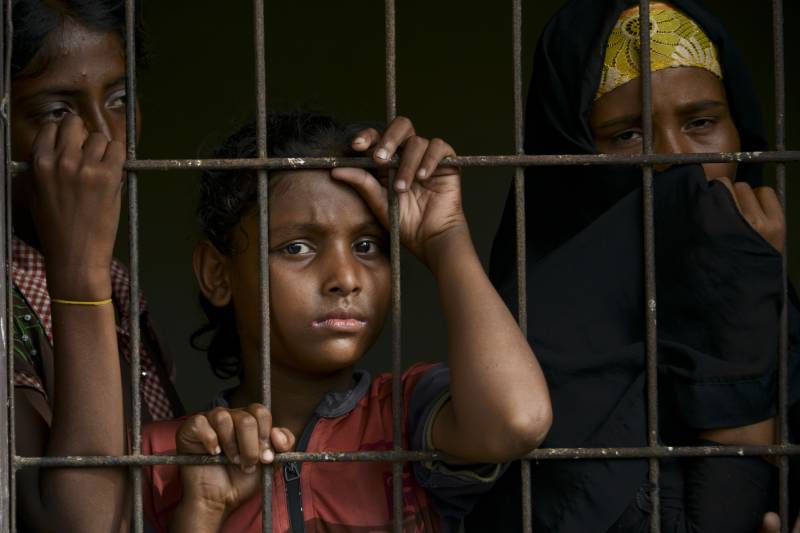Death and despair: Rescued Rohingya describe high-seas terror

Stay tuned with 24 News HD Android App

A group of Rohingya say they were beaten by traffickers and drank their own urine to stay alive on a perilous four-month journey at sea until their dramatic rescue near the Indonesian coast.
The bedraggled survivors -- about 100 in all, mostly women and children -- described a high-seas horror story that saw them reduced to throwing the dead overboard as their rickety craft drifted thousands of kilometres towards Malaysia.
Two survivors claimed that people smugglers paid to transport them had beaten the Rohingya who were later moved to a new boat and abandoned at sea.
They were rescued by fishermen in Indonesia on Wednesday and pulled to shore by locals the next day, thousands of kilometres south of Bangladesh.
"We suffered so much on that boat," 50-year-old Rashid Ahmad told AFP at an immigration detention centre in Lhokseumawe city on Sumatra's northern coast.
"They tortured us and cut us. One of us even died.
"There was food at first but when it was done they (the traffickers) took us onto another boat and then let us float away alone," he added.
Another survivor, Habibullah, said: "They beat everyone badly. My ear was cut and I was beaten on the head."
AFP could not independently verify the accounts of four members of the vulnerable Muslim minority group, who said they set off earlier this year near a Rohingya refugee camp in Bangladesh, next to their native Myanmar.
- Starving, thirsty -
Survivor Ziabur Rahman Bin Safirullah, 35, said the group got by on small rations of rice and nuts while relying heavily on rainwater to survive.
"Sometimes we squashed wet clothes and drank the water from them," he said, adding that those who died were thrown into the sea.
Korima Bibi said at least two people died during the voyage and that some on board resorted to drinking urine to stay alive, as others got sick from the rough seas.
"We didn't get enough food or water," the 20-year-old said, "(but) we survived."
Among the roughly 100 in the group were 48 women and 35 children.
They set off from the Balukhali refugee camp in southern Bangladesh, but were originally from Myanmar's conflict-torn Rakhine State, according to survivors and an account given to the International Organization for Migration (IOM).
A spokesperson for the group told the IOM that one woman had died on the way, leaving behind her two children.
Another three children, two of them siblings, and a 10-year-old girl were unaccompanied. The group also included a pregnant woman, according to the IOM.
The smugglers were charging each person about $2,300 to get them to Malaysia, the IOM said.
Around a million Rohingya live in cramped and squalid refugee camps in Bangladesh, where human traffickers also run lucrative operations promising to find them sanctuary abroad.
Indonesia, the world's biggest Muslim majority nation, and neighbouring Malaysia are favoured destinations for Rohingya fleeing persecution and violence in mostly Buddhist Myanmar.
Thousands try a perilous escape via smugglers across the sea each year.
About 1,400 Rohingya have been stranded at sea this year -- and at least 130 of those have died, according to IOM figures.
- 'A thousand thanks' -
Last week, a Malaysian coastguard official said dozens of Rohingya were believed to have died during a months-long journey to that country.
There had originally been more than 300 people on board the boat that was intercepted by authorities this month, with the 269 survivors given temporary shelter.
Neighbouring Indonesia has previously allowed Rohingya to land and many to stay.
But wary officials have turned them away in recent months, worried they could be carrying the deadly coronavirus.
That concern played out in dramatic fashion on a beach in Lhokseumawe on Thursday when the Rohingya survivors were pulled to shore by locals furious at the refusal of authorities to give them shelter over COVID-19 fears.
They had spent the night several hundred metres offshore, waiting for a decision on whether they could land.
Authorities eventually relented -- a move cheered as a victory by rights groups. All have since tested negative for the coronavirus, local officials said.
But the group's fate remains uncertain.
"Äs a fellow Muslim I felt compassion for them, especially because there were so many children and women -- it broke my heart," said Lhokseumawe resident Saiful Hardi.
"I hope we continue to help them as fellow human beings."
That decision will be up the government, meaning an uncertain fate for survivors like 20-year-old Bibi.
"You people saved us so a thousand thanks for that," she said.
"Now it's up to you."
